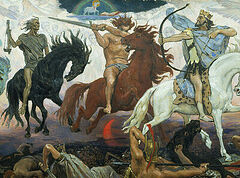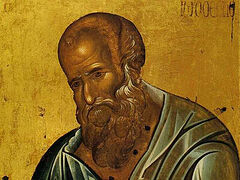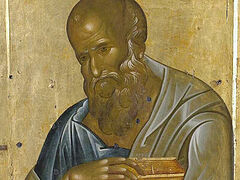Such a danger awaits us until the very last moment
Behold, I come quickly: hold that fast which thou hast, that no man take thy crown (Rev. 3:11). The Lord is coming soon. God doesn’t delay, because there’s no time for God. We might feel like saying: “So long, so many years!” There is no such time for God; He’s always with us. He never leaves us.
We think He’s not there. We say: “And where is God? Why did God leave me alone? I’m trying, but I don’t see or understand anything. I feel alone, abandoned, discarded.” God is near; He hasn’t left you. But He gives you the chance to act like a human being, to do the things that require human effort, and then the Lord will reveal His presence in your soul. The Lord is coming soon. Be careful not to be negligent, to not let your attention scatter here and there—at this time, someone can steal your crown that you’ve been weaving for yourself for so long with your patience. A man can lose everything; such a danger awaits us until the very last moment.
Unfortunately, we can undertake great feats and then lose everything in a moment due to our carelessness, our pride, our passions. May the Lord protect us from this. So we have to be careful.
Make sure to hold tight to what you have. Don’t throw it away; don’t leave it. Temptation doesn’t happen when satan or someone tells us: “Renounce God!” No, that’s too simple and obvious. Satan has too many ways to lead us into losing God.
Elder Paisios asked us: “What did Pharaoh do when he wanted to make the Jews forget about God, to lose the desire to serve God?” He gave them work and money. He told the Egyptians: “Give them food, whatever they want, even a little more, so they eat well. And give them work for the whole day.” If they eat and work all day, they’ll forget about God. And this is exactly what satan does with us sometimes. He gives us a ton of work so we’ll spend the whole day amidst work and worries. He also gives us the means to have a good time thanks to this work. And the result is that we lose our aspiration, our direction, and we forget where we’re going.
How many times has this happened to all of us? Worries begin to pull on us more and more. You see people who are getting old but they continue to invent new jobs for themselves. They live to be fifty and take up new activities; they reach sixty and they’re still working; they hit seventy and they have all new worries and labors; then eighty and they still don’t stop. They think they have 200 years to live. What we have to do must be done quickly and decisively. You don’t know what could happen.
He will be a pillar of the Church
In verse 12, he says: Him that overcometh will I make a pillar in the temple of My God, and he shall go no more out: and I will write upon him the name of My God, and the name of the city of My God, which is New Jerusalem, which cometh down out of Heaven from My God: and I will write upon him My new name (Rev. 3:12). He will hold a place that will be a pillar of the Church, that will uphold the Church. Christ will call him by the name of His God. Not because God the Father is God the Son, but because God is the Creator of the human nature of Christ, and of course, His God. And he will no longer leave the church, and the name of God will be inscribed on this man. This faithful, this holy man of God who has endured everything to the end will know God, will have a Divine experience, will be the abode of God. In some way, the name of God and the name of the city of God will be written on him. What is the city of God? New Jerusalem, the Church of Christ. It descends from Heaven, from God. It’s given us from above, from God. And on this faithful man will be written the new name of God—the name of grace, the name of the Holy Trinity, the name that God gives us by grace through our Baptism and through the Sacraments of the Church.
The epistle to the Bishop of the Philadelphia Church ends with the His usual words: He that hath an ear, let him hear what the Spirit saith unto the Churches (Rev. 3:13). Those who have ears hear, but those who don’t, unfortunately, hear but don’t listen.
To the angel of the Church of Laodicea
And unto the angel of the Church of the Laodiceans write; These things saith the Amen, the faithful and true witness, the beginning of the creation of God (Rev. 3:14). “The Amen”—this is what God calls Himself in the Old Testament: Amen, holy, Sabaoth, and so on. Christ spoke with the Prophets in the Old Testament; they saw and heard Him. Christ is the Witness; He testifies, He is faithful and true, and the beginning of creation.
 The Ancient of Days. 14th C., Ubisa, Georgia
The Ancient of Days. 14th C., Ubisa, Georgia
Jehovah’s Witnesses say: “Look, He is the beginning of creation. That means He’s the first creation.” But unfortunately, it seems they don’t know Greek. The beginning of creation doesn’t mean the first creation, but it’s the One Who created everything else. For example, when we say the head1 of the government, we mean the president, that is, the head—it’s authority, the one who created everything else, who caused everything. Christ created all of nature, all of creation is from Him. He is uncreated.
Neither cold nor hot
I know thy works, that thou art neither cold nor hot: I would thou wert cold or hot (Rev. 3:15). Again the Lord says that he knows the bishop’s works. You can’t hide from God. It’s easy to deceive people, to mislead them, to seem good, to smile—we manage that well. Not everyone can figure us out. But you can’t deceive God. God sees us to the depths of our soul; He knows everything, even to the smallest particle of our being—even what we can’t see ourselves. Even what our mind and heart can’t explore, God sees.
And further, the Lord utters fearful words: Thou art neither cold nor hot. “I know, that you are neither cold nor hot.” As we say in Cyprus: “In the middle of the road.” It would be good for you to be either cold or hot. So then because thou art lukewarm, and neither cold nor hot, I will spue thee out of My mouth (Rev. 3:16). “Inasmuch as you are lukewarm—not hold or cold—I will spit you out of My mouth. I don’t want you.”
Just as we can vomit from disgusting food, so will God do with him because he’s lukewarm. Someone may say right now: “Maybe it’s better to at least be lukewarm than cold. Lukewarm is still a bit hot. It’s better than icy, right?”
Why does Christ reject the lukewarm? Because the lukewarm man doesn’t realize that he’s that way, and remains that way. The cold man can at any moment realize it and be horrified: Why is he like that; why is he so far from God; why is he such a sinner; why is he so unfortunate? There’s room before him for repentance.
But the lukewarm man thinks he’s good, he thinks something is going well for him, that he’s doing something, that he certainly won’t be lost. He does a little here and a little there. But it doesn’t work that way. The word of God is absolutely clear here. We should be hot, not cold—far from God. But not lukewarm. A lukewarm man lives in Christ formally; for him, the word of God is a kind of example of good behavior. He may be a very good man, exceptional, but he has no fire of the Holy Spirit in him; his soul is lifeless.
What is the sign of holy people? For those saints whom we have known in our days and who still live among us, perhaps already elderly, even 100 years old, it’s a living soul. They’re hot, with a living soul. You see an old man before you, his body almost dead, but his soul is more alive than the living. And conversely, sometimes you meet people who are young in body but dead in soul. You see a man with a strong body, he goes to the gym, he has strong muscles, but his soul is weak, barely flickering, hardly visible. The soul has no strength, the heart is silent, it fears everything, the passions are boiling in it.
Do you remember the episode from the Gospel? A young man came to Christ and asked him what he should do to follow Him. Christ told him to sell everything and follow after Him. When the young man heard this, he was very upset. Why? He was rich and couldn’t detach himself from his wealth. The Gospel says he had many houses, and he didn’t leave them. Then he had to leave them to others, but he had already lost the calling of God. His soul wasn’t alive; his heart wasn’t hot.
You may say: “Father, you speak well, but still, that’s what we are—lukewarm people. We live in this world. We’re weak, passionate. What can we do?”
Further, Christ gives this bishop important advice. He tells him that He’ll throw him away if he’s like this. Do you see how directly Christ speaks? There’s no false politeness or ambiguity in Him. He tells the bishop exactly what He’ll do with him: He’ll spew him out of His mouth, without ever even looking at him again, because he’s too revolting to keep him inside Him.
 Christ and the Rich Young Ruler, Heinrich Hoffman. 1889
Christ and the Rich Young Ruler, Heinrich Hoffman. 1889
Do you consider yourself an important person?
Because thou sayest, I am rich, and increased with goods, and have need of nothing; and knowest not that thou art wretched, and miserable, and poor, and blind, and naked (Rev. 3:17). What fearful things Christ says about him! This isn’t some man who can make mistakes speaking. It’s God Himself speaking. His word is absolute, befitting God.
You think you’re rich, you think you’re something, that you don’t need in anything, but you don’t know yourself. It’s a tragedy that he considered himself an important person. And the main cause of his suffering was that he didn’t want to see himself as he is—pitiable, pathetic, poor. He was absolutely poor, blind, and naked. We often think that we’re really something, that we’re rich and influential.
What does the Lord advise him? I counsel thee to buy of Me gold tried in the fire, that thou mayest be rich; and white raiment, that thou mayest be clothed, and that the shame of thy nakedness do not appear; and anoint thine eyes with eyesalve, that thou mayest see (Rev. 3:18). The Lord advises him to buy from Him gold that has been purified by fire and is burning. “You will receive grace from Me, which burns with fire. It is the purest, purified by fire. You will be enriched by it. It will make you rich. Everything else is poverty, nakedness. Come and I will give you wealth and strength. I will give you white garments, bright and clean, to clothe yourself, so your nakedness would not be visible before the whole world. I will give you an eye salve that your eyes might see.” Christ calls him to give him what he lacks. And what he lacks is grace, not everything else. He needs grace to adorn himself and become rich, in order to see and wake up, to understand who he really is.
As many as I love, I rebuke and chasten: be zealous therefore, and repent (Rev. 3:19). So what was said wouldn’t seem too harsh, Christ says that He loves him, therefore he rebukes and punishes him. “I’m telling you this because I love you. I want to rebuke and punish you. Return to zeal for God, kindle Divine zeal in your soul, repent of everything you’ve done that’s made you unhappy, destitute, and naked. Don’t think I’m far away, that I despise and avoid you, that I’ve cast you out.”
“I stand at the door, and knock”
Behold, I stand at the door, and knock: if any man hear My voice, and open the door, I will come in to him, and will sup with him, and he with Me (Rev. 3:20). What door is the Lord standing at? Of course, at the door of our heart, not at the door of our house. Of course, the Lord sometimes knocks on the door of our house too. People come to us to ask for alms, and we close the door before them. You see, it depends on us whether Christ enters our heart, and not on Christ. No one can say: “I want it, but where’s the grace? Christ doesn’t come, doesn’t accept me, doesn’t remember me…” No. Christ stands at the door and knocks on our heart. How does He knock? In different ways—both by His word and His presence, and the multitude of trials in our lives, and through the circumstances of our lives—in thousands of ways, in all possible ways, the Lord knocks on the door and asks us to open to Him, that He might enter. He doesn’t break down the door; Christ doesn’t break it, but waits for us to open the door willingly, for Him to come in and sup with us, and we with Him.
To him that overcometh will I grant to sit with Me in My throne, even as I also overcame, and am set down with My Father in His throne (Rev. 3:21). Like the God-Man. The human nature of Christ sits on the right hand of God the Father. He that hath an ear, let him hear what the Spirit saith unto the Churches (Rev. 3:22).
With this ends the seven epistles to the seven bishops of the Churches. But they’re so strong, so frank, that we find ourselves among them. It remains for us only to open the door, because we understand that we are poor and naked, pitiable and poor. Let us ask Christ to come inside of us that He might revive our heart and our whole being.






